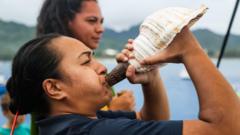The Cook Islands are standing at a crossroads with plans to exploit the seabed for valuable polymetallic nodules, a move that has received mixed sentiments from the local population. Jean Mason, curator of the Cook Islands Library and Museum, holds up a peculiar rock dubbed a polymetallic nodule, which is rich in cobalt, nickel, and manganese. These resources are crucial for modern technologies ranging from electric vehicles to smartphones. Prime Minister Mark Brown champions this initiative, envisaging it as a game-changer for the economically challenged island nation comprising 15 volcanic islands.
While proponents argue that extracting these nodules could provide financial stability and would play a role in renewable energy transition, critics caution against the environmental risks inherent in deep-sea mining. Many citizens express concern over the unknown repercussions of disturbing one of Earth’s last pristine marine environments. As the Cook Islands is significantly impacted by climate change, with rising sea levels threatening its existence, the oceans are not only a lifeblood resource but also a potential economic boon if managed correctly.
Jean Mason and others support the mining venture, underscoring a long history of nodule discussions dating back over fifty years. The Seabeds Minerals Authority estimates these valuable deposits rest in over 12 billion tonnes beneath the ocean's surface. Licensing for exploration has already been granted to several companies eager to tap into this undersea wealth. Nonetheless, detractors highlight that this could prove to be impractical or disastrous, as market demands for such metals may shift by the time the mining operations commence.
Activists, gathering off Rarotonga’s coast, chant for environmental preservation and request thorough independent research before proceeding with mining initiatives. Environmentalist Alanah Matamaru Smith stands firm in voicing the need for community awareness of the potential risks involved, as the government moves ahead with plans to accommodate offshore companies.
Prime Minister Brown, who also oversees tourism and seabed minerals, envisions using profits from mining to create a sovereign wealth fund akin to Norway's. He argues that without diversifying income streams, the islanders risk facing dire economic conditions exacerbated by climate change, given their reliance on tourism — which suffered heavily during the COVID-19 pandemic.
However, skepticism persists among some residents, such as activist June Hosking from the less populated outer islands, who feel that consultations held thus far might not address critical concerns. Often, any dissent towards government plans can lead to social pushback, as local politics intertwine with community ties.
As the Cook Islands navigate their future, the primary question remains: will deep-sea mining lead to a more prosperous tomorrow, or will it compromise the fragile ecosystem they cherish? The outcome hinges on how the balance is struck among economic ambition, environmental stewardship, and community voices.
While proponents argue that extracting these nodules could provide financial stability and would play a role in renewable energy transition, critics caution against the environmental risks inherent in deep-sea mining. Many citizens express concern over the unknown repercussions of disturbing one of Earth’s last pristine marine environments. As the Cook Islands is significantly impacted by climate change, with rising sea levels threatening its existence, the oceans are not only a lifeblood resource but also a potential economic boon if managed correctly.
Jean Mason and others support the mining venture, underscoring a long history of nodule discussions dating back over fifty years. The Seabeds Minerals Authority estimates these valuable deposits rest in over 12 billion tonnes beneath the ocean's surface. Licensing for exploration has already been granted to several companies eager to tap into this undersea wealth. Nonetheless, detractors highlight that this could prove to be impractical or disastrous, as market demands for such metals may shift by the time the mining operations commence.
Activists, gathering off Rarotonga’s coast, chant for environmental preservation and request thorough independent research before proceeding with mining initiatives. Environmentalist Alanah Matamaru Smith stands firm in voicing the need for community awareness of the potential risks involved, as the government moves ahead with plans to accommodate offshore companies.
Prime Minister Brown, who also oversees tourism and seabed minerals, envisions using profits from mining to create a sovereign wealth fund akin to Norway's. He argues that without diversifying income streams, the islanders risk facing dire economic conditions exacerbated by climate change, given their reliance on tourism — which suffered heavily during the COVID-19 pandemic.
However, skepticism persists among some residents, such as activist June Hosking from the less populated outer islands, who feel that consultations held thus far might not address critical concerns. Often, any dissent towards government plans can lead to social pushback, as local politics intertwine with community ties.
As the Cook Islands navigate their future, the primary question remains: will deep-sea mining lead to a more prosperous tomorrow, or will it compromise the fragile ecosystem they cherish? The outcome hinges on how the balance is struck among economic ambition, environmental stewardship, and community voices.





















